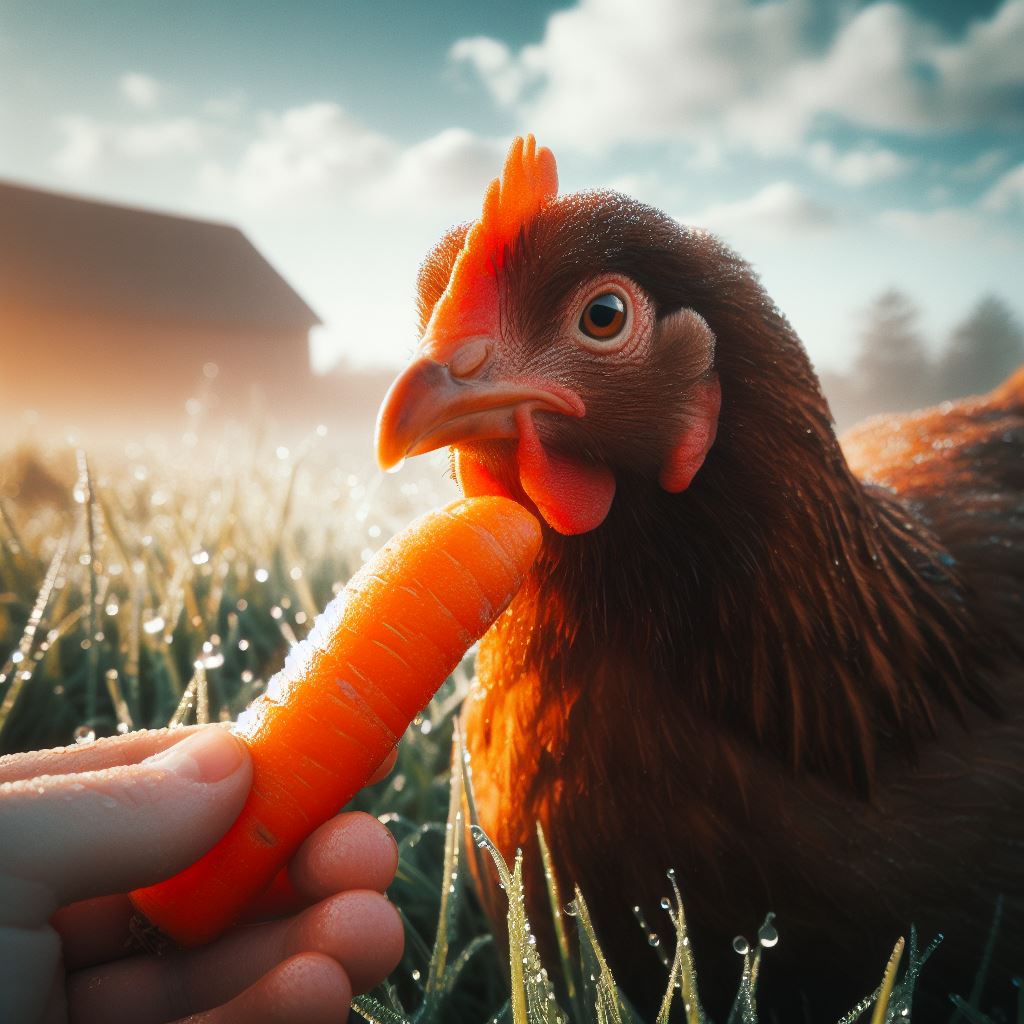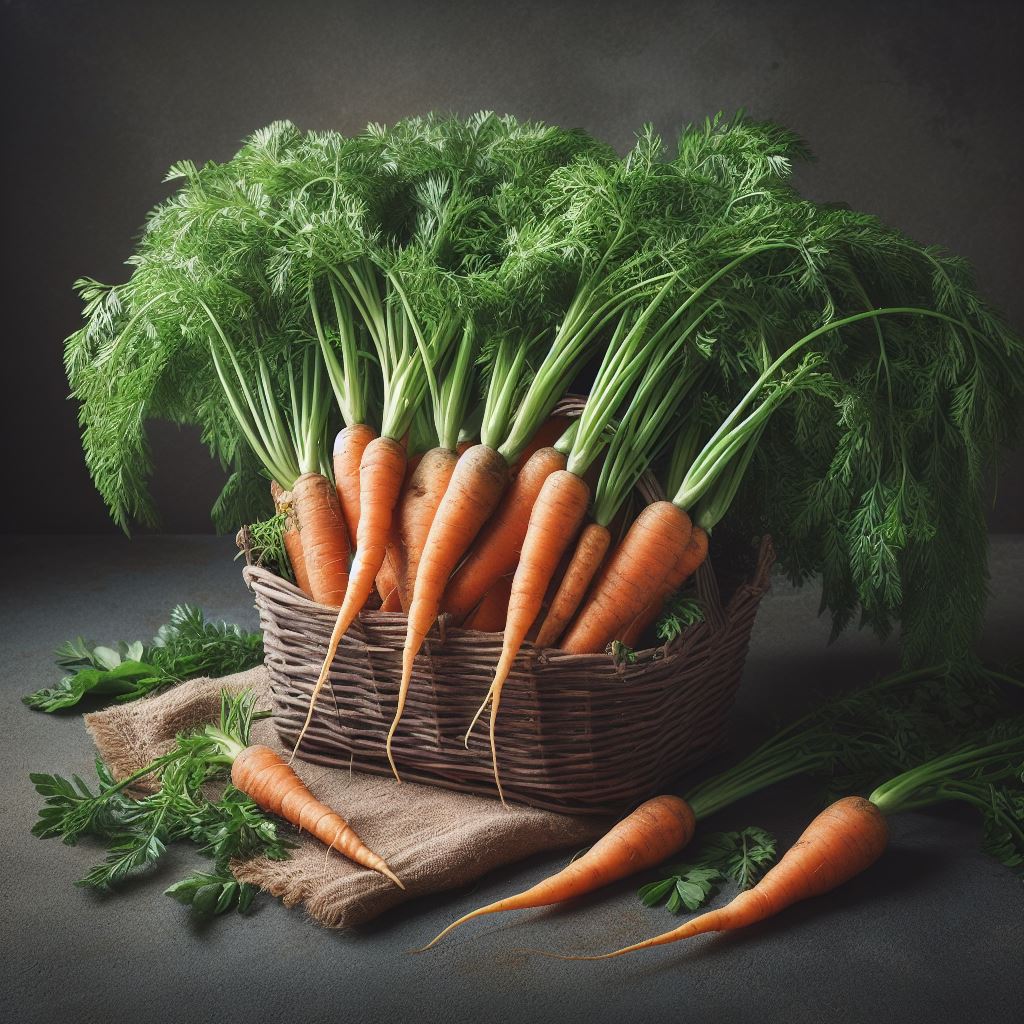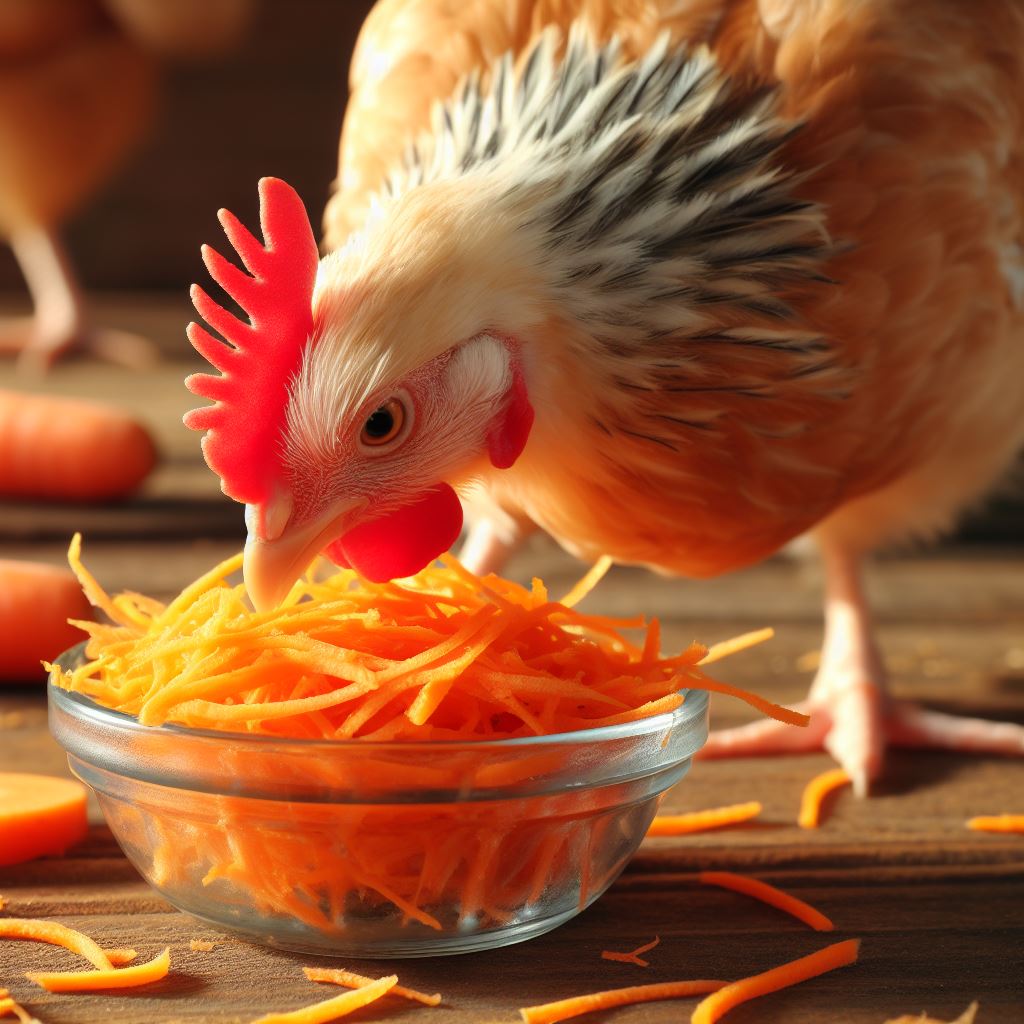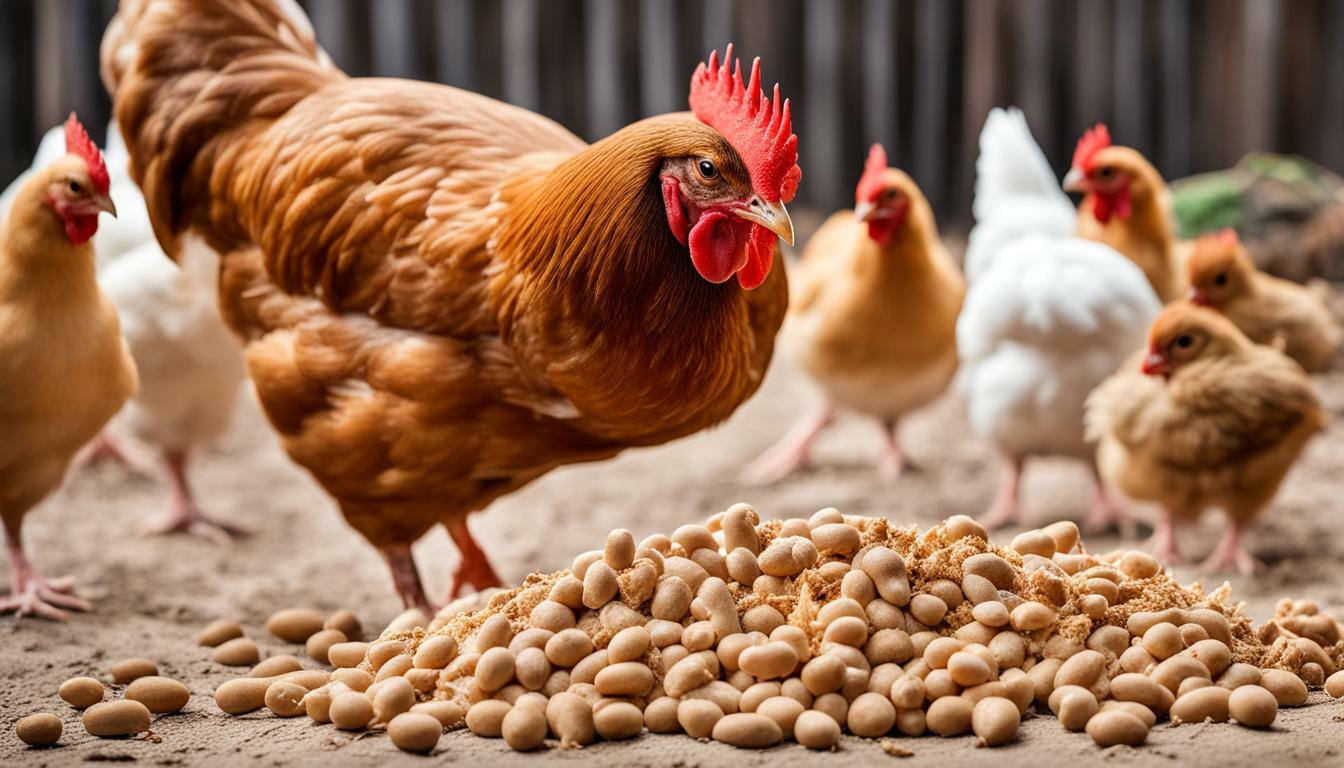Can Chickens Eat Carrots?

Table of content:
Yes, In moderation, carrots make an excellent supplement to a chicken’s regular feed. Carrots make a nutritious and appealing treat for backyard chickens. As responsible chicken owners, it’s important to understand how to feed carrots safely as part of a balanced diet.
Carrots are packed with vitamins, minerals and antioxidants that can promote chicken health. The beta-carotene in carrots helps chickens produce vibrant egg yolks. Carrots also provide vitamins C, K, potassium and fiber.
Benefits of Carrots for Chickens
- Vitamin A: Carrots are rich in beta-carotene, which chickens convert to vitamin A. This helps promote eye and skin health.
- Antioxidants: Carrots contain the antioxidants vitamin C and lycopene to boost chicken immunity.
- Vibrant egg yolks: The beta-carotene in carrots helps create golden, nutrient-rich egg yolks.
- Healthy digestion: Carrots provide fiber for gut health and disease prevention in chickens.
- Strong bones: Vitamins A, C and K support bone health and development in chickens.
- Feather growth: The nutrients in carrots help chickens grow vibrant, colorful plumage.
 Nutritional Profile of Carrots
Nutritional Profile of Carrots
A 100g serving of raw carrots contains:
- 41 calories
- 10.6g carbohydrates
- 0.93g protein
- 0.24g fat
- 2.8g fiber
- 11,149 IU vitamin A
- 5.9mg vitamin C
- 13.2mcg vitamin K
- 320mg potassium
This nutritional profile makes carrots a valuable addition to a chicken’s diet in moderation.
Feeding Carrots to Chickens
Carrots can be fed to chickens either raw or cooked. Here are some tips on preparing and serving carrots:
- Chop or shred carrots to an appropriate size for chickens to swallow easily. Large pieces may pose a choking hazard.
- Cook carrots by boiling, steaming or roasting until soft. Cooked carrots are easier for chickens to digest.
- Mash cooked carrots into a soft puree for baby chicks.
- Mix chopped or shredded raw carrots into chickens’ regular feed. This encourages reluctant chickens to try new foods.
- Hang whole raw carrots in the coop for chickens to peck at. The activity provides entertainment.
- Refrigerate uneaten fresh carrots for up to 3 days. Discard任意carrots if they become slimy or smell unpleasant.
How Much and How Often Can Chickens Eat Carrots?
Carrots should be fed to chickens in moderation as an occasional treat. Too many carrots can cause loose droppings, diarrhea, or yellowish skin discoloration from excess beta-carotene. Follow these recommended guidelines:
- Chickens can eat up to 1-2 oz of chopped carrots per bird 1-2 times per week.
- Carrot tops can also be fed in moderation. They contain vitamin K, calcium and protein.
- Avoid feeding carrots daily or free-feeding large amounts. Carrots should comprise no more than 10% of a chicken’s overall diet.
- For chickens deficient in vitamin A, up to 1/4 cup carrots per bird 2-3 times per week can restore healthy levels.
- Reduce carrot quantities during molt to prevent loose feathers and diarrhea.
- Eliminate carrots from the diet 1 week before shows to prevent discolored skin.
Always provide plenty of fresh water when feeding carrots to help chickens digest additional fiber.
 Potential Concerns with Feeding Carrots
Potential Concerns with Feeding Carrots
While carrots make a safe, nutritious supplement for chickens, be aware of the following considerations:
Allergies
Some rare chickens may be allergic to the compounds in carrots and develop diarrhea or intestinal discomfort. Discontinue carrots if any sensitivity is observed.
Choking Hazard
Large carrot chunks can lodge in a chicken’s throat. Always dice or shred carrots into small pieces the size of a pea or smaller. Cook or mash carrots for very young chicks.
Diarrhea and Loose Droppings
Too much carrot fiber and beta-carotene pigment can temporarily cause loose stool. Reduce quantities or eliminate carrots until droppings firm up.
Discolored Skin
The yellow-orange carotenoids in carrots may lead to a yellowish tint on some chickens’ skin, legs and beaks. This is only a cosmetic issue but should be avoided before shows.
Molting Side Effects
The nutrients in carrots help stimulate feather growth. However, excess carotenoids can sometimes cause loose or poorly attached feathers during molt. Go light on carrots when chickens are molting.
Root Vegetable Concerns
Some backyard chicken keepers believe that root vegetables may increase the risk of crop impaction and other digestive issues. However, controlled amounts of carrot fiber can aid digestion.
By following the recommended feeding guidelines for carrots, chicken owners can safely provide this vitamin-packed veggie as a supplemental treat. Monitor chickens when introducing new foods and discontinue use if any adverse reactions occur.
Healthy Ways to Prepare and Serve Carrots
Here are some nutritious carrot recipe ideas for backyard chickens:
Raw Carrot Salad
Mix shredded raw carrots with chopped kale, spinach, apple, and a drizzle of olive oil. The oil helps chickens absorb fat-soluble carotenoids and vitamins from the carrots and greens.
Roasted Carrots
Roast chopped carrots tossed lightly in avocado oil at 400°F for 20 minutes until soft. Roasted carrots have a sweet flavor chickens love.
Steamed Carrots with Herbs
Steam chopped carrots for 10-15 minutes until very soft. Toss with fresh parsley or dill for added nutrients and flavor.
Carrot-Apple Puree
In a blender or food processor, combine cooked mashed carrots and applesauce into a smooth puree for chicks. The apple balances the carrot’s sweetness.
Carrot Top Pesto
In a food processor, blend carrot tops, basil, olive oil, nuts and garlic for an antioxidant and vitamin K-rich “pesto” to mix into feed or serve over cooked grains or mash.
With a little creativity, backyard chicken keepers can come up with diverse ways to serve carrots that both chickens and their owners will appreciate!
Frequently Asked Questions About Chickens and Carrots
Chicken owners new to feeding carrots may have some common queries. Here are answers to some frequently asked questions:
Can baby chicks eat carrots?
Yes, but the carrots should be cooked and mashed into a puree for easy digestion. Avoid hard, raw carrot pieces that could pose a choking risk to young chicks.
What part of the carrot can chickens eat?
Chickens can eat all parts of the carrot plant. The orange carrot root is the most common edible part fed to chickens. The leafy green carrot tops are also edible and nutritious. Even carrot shavings or peelings make a tasty treat.
Can chickens have too many carrots?
Yes, chickens should not get too many carrots. Excessive carotenoids can cause yellowish skin discoloration and loose droppings. Limit carrots to a few small servings per week and avoid overfeeding.
Do carrots make yolks more orange?
Yes, the beta-carotene pigments in carrots can lead to richer, golden orange colored yolks if chickens eat moderate amounts regularly. Too many carrots, however, may cause excessively orange yolks.
Can I replace chicken feed with carrots?
No, carrots should never completely replace balanced layer feed. Carrots only provide supplemental nutrition. Chickens require proper feed rations for their overall dietary requirements.
Are carrot tops safe for chickens to eat?
Yes, carrot tops are edible and contain chlorophyll, minerals and vitamins. Chickens can eat carrot tops in moderation together with the roots. Introduce new greens slowly to watch for any adverse reactions.
Can chickens eat carrot peelings or scrapings?
Absolutely. Chickens will gladly gobble up any carrot leftovers or peelings from the kitchen. Just be sure these scrapings are raw, not cooked with any seasonings or oil.
Conclusion
Carrots make a nutrient-packed supplemental food for backyard chickens when fed properly and in moderation. Carrots provide vitamin A, antioxidants and carotenoids to promote chicken health, egg quality and feather growth.
Owners should introduce carrots gradually, pay attention to recommended serving sizes, and monitor chickens for any adverse reactions.
With a little care and common sense, chicken keepers can safely incorporate carrots into their flock’s feeding regimen for a wholesome, delicious treat. For chicken health and happiness, carrots get top marks!
Welcome. I’m Adreena Shanum, the proud owner of this website, and I am incredibly passionate about animals, especially poultry. I founded adreenapets.com as a labor of love, stemming from my desire to share my knowledge and experiences with poultry enthusiasts worldwide.




